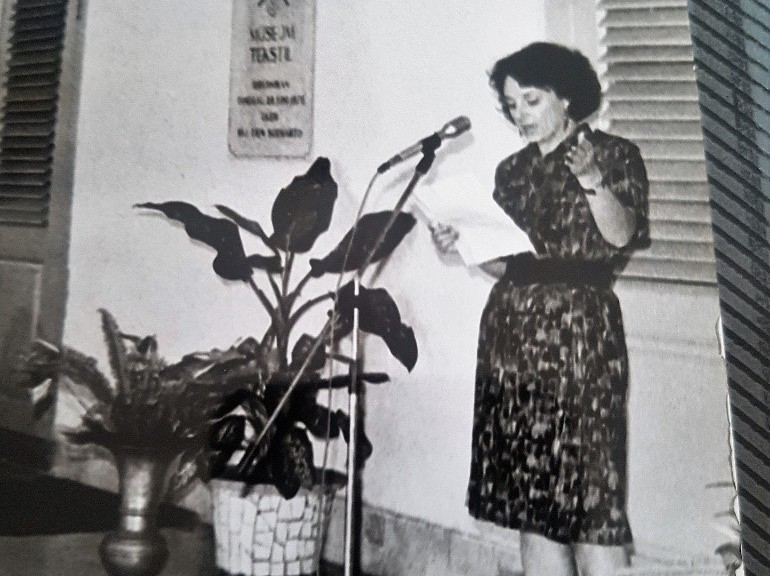"We found common interests, beyond business"
by Johannes Brömmel (1999) Gisela-Gymnasium, München/Germany on 2018-01-11

Dealing with diversity and building bridges are the diplomat’s key competence
The great Wall that is supposed to be built between USA and Mexico. Donald Trump`s travel ban for people from certain countries. The dispute between European countries and the Turkish government about them giving election speeches in European states. The refugee crisis 2015/16 in Europe.
All these are examples of major topics in our world that have to do with cross-cultural communication. In our age of digitalization and globalization different cultures have to get along with each other. But what is the best way to approach others, that have a different background? A few weeks ago, I met a Diplomat and took the opportunity to ask her for an interview to discuss exactly that and other topics.
trait d’union: First off, could you please introduce yourself?
Ms. Beddie: My name is Francesca Beddie. I am an Australian, who worked in the foreign ministry from 1983 until 1995 and I then spent several years working in Australia’s development assistance agency called AusAID. When I left the foreign service, I started to train in communications, policy development and cross-cultural communication.
trait d’union: Ok, thank you. I wondered, is there a certain way/path one becomes a diplomat? I mean there isn’t a university course, is there?
Ms. Beddie: Well, not when I was doing it. Increasingly now there are some courses, in fact I do some work for the Australian National University, which has something called the Asia-Pacific-College of Diplomacy. And so, there is a possible academic pathway. But no, most graduates whom I teach now do other degrees in law, in languages, in international relations, some in economics. I did history and German. And then it was competitive to enter the foreign service, but now it is even more competitive. It’s a very convoluted or difficult long process of application. They look at your academic ability, but they’re looking for something else as well. So, for example, having travelled, having volunteered, having had experience working in a different culture. All those things add up to help you compete to get a place.
trait d’union: These examples are a good transition to my next question. Because I wanted to know, what role intercultural competence plays in the life of a diplomat and how important it is in that field?
Ms. Beddie: I think it’s essential. It has always been, and you will find early diplomats in the middle ages, in the renaissance, throughout the centuries making comments about this. We still have a diplomatic-corps: people on the ground representing their countries, even in the days of Skype. Here we are, talking across the oceans. And the reason we do that I think is, because it is only with a sensitive and nuanced understanding of other cultures that diplomats and indeed nations can effectively do what we’re aiming at. Which is, if you want to put it in an idealistic way, to keep the peace.
trait d’union: Do you have any example, maybe a story which relates to intercultural competence or intercultural differences?
Ms. Beddie: Yes, I do. My own background as I mentioned at university was in European history and languages. I studied French at school and German in particular, and I lived in Germany. I then, when I started out, was sent off to learn Indonesian, which is a completely different language and I served in Jakarta. It was a wonderful experience At one stage, I worked in the office of the foreign minister. And of course, foreign ministers deal with everything. They’re not necessarily specialists in any culture.
I went with our minister on a North-Asian trade delegation. We went to Korea and Japan to negotiate entrance of Australian beef into the Asian market. In Korea we were quite successful, we pretty much signed a deal. And then we went to Japan. It was my first trip to Korea, but I had been to Japan before. It’s quite obvious even on a quick trip, that the Koreans and the Japanese have very different styles and cultural ways of doing things, even though we think of them both as from North Asia. So, when we got to Tokyo we were happy because we had sold the beef to the Koreans and thought this was a good omen. We went and sat in the trade minister’s office with a huge delegation because everyone had their own interpreters. It was very formal. There were no smiles as there had been in Korea. And it was a slow meeting because everything had to be translated. On our side the ambassador had very good Japanese but most of the rest of us didn’t speak Japanese so we had to wait for the interpreters. Still it was clear the meeting wasn’t going very well. And then the trade minister took from his pocket a beautiful little implement. It was all well-polished silver. And he started to clean the wax out of his ear.
This, for us was absolutely shocking. This sort of hygiene process is something you do very privately. And certainly not in the middle of a very formal atmosphere. That threw us. But I think in the end it was a signal that he was bored. He was giving us a nonverbal sign that things were coming to a close. That evening we went to dinner. Very beautiful, very formal, absolutely precisely served with cherry blossoms and snow in the glassed garden behind us. It was gorgeous. They served us Kobe beef which is the absolute top beef in japan. And Grange Hermitage wine which is one of the most expensive wines Australia produces. We knew without anyone telling us that the deal was off. We had not succeeded.
trait d’union: There are certainly many examples of different non-verbal signs for people in other countries. I think in Bulgaria one nods his head when it’s no and shakes it when it’s yes.
Ms. Beddie: In Indonesia it’s very impolite to say no. Or I don’t know. So, if you mean no you can say yes sometimes, or people will say not yet or perhaps. They will try to avoid that blunt no. Australian negotiators tend to be much more direct, what I would call transactional. So, they come to Jakarta to find out something, sell something in the business sphere, whatever. And they want to get on with it. They are short on time. We used counsel them strongly to be prepared not to get a straight answer but also to build trust before they started talking about their main business aims. This is I think where the diplomat’s role was so important. Because we knew the people, we had learnt about them, spent time with them, we found common interests, beyond business. And it was then that we were able to actually start to achieve things. For me, as a diplomat reporting on politics, it was mainly about getting good information, but it was also about getting things done, helping trade delegations, arranging meetings etc.
trait d’union: When you say, “getting information” I wonder does that mean anything or are there certain information goals for different diplomats?
Ms. Beddie: It depends on what you are doing. And I am not talking about spies.
trait d’union: Yea I wasn’t referring to that.
Ms. Beddie: When I was first in Indonesia my role was to understand and write about domestic politics in Indonesia. It was a very different time. The place was run by Suharto, who was kind of a dictator. The press was very constrained and, so you couldn’t just go and get the newspapers and read about things. It wasn’t like being a journalist finding interesting stories to report. We wanted to find out things that were important to Australia’s national interest. For example, we needed to understand better what the radical Muslims were doing, what the underground opposition was thinking. We also wanted to represent our views on universal issues that we considered important, for example about human rights or upholding the law. The Indonesians didn’t always like us airing these views and we had to be careful and understand how best to put forward out concerns. I have a story about that if I am not talking not too much.
trait d’union: That’s the purpose. You are supposed to be talking much. You are the one with the information and experience that is interesting for our articles so go ahead!
Ms. Beddie: Well, I’m not sure if it’s exactly about intercultural communication, but I have to say it’s something that made a huge impression on me when I was in Indonesia. I was quite young. I believe strongly in human rights, and I remain very opposed to the death penalty. I think the state shouldn’t execute anyone, that’s not to say they shouldn’t be punished. But I learned from this story that the way you do things matters. In those days there were still people in jail who had been members of the Indonesian Communist Party, and were arrested in the aftermath of the 1965 coup. People were rounded up and many, many were massacred over the next year. It was a stain on Indonesia’s modern history. And every year on Independence Day which is the 17th of August, president Suharto would have a list of people on death row who had been there for 20/30 years and some he would pardon and some he would shoot. We, through Amnesty International in particular, knew which of these members of the Indonesian Communist Party, so political prisoners, were on death row and we would make representations to the government. We would send them a formal diplomatic note saying Australia did not think on principle any government should kill anyone, and these people should not be on your ‘shooting list’. We wouldn’t say it quite like that obviously. And then one day through my friends and contacts I received an informal approach from a friend of the wife of one of these people on death row pleading with me not to include the name of the husband on the list.
trait d’union: You mean the list that you sent to the government with the people that shouldn’t be executed?
Ms. Beddie: Yes. She was terrified that if we gave him prominence, if we actually made him more visible, that there was more likelihood that he would be shot. That’s when I realised how careful we had to be in how we made our representations. Some people would call this relativism, that we have to stand up for what we believe, but I think in diplomacy you learn that sometimes you have to be patient but also not public and that there are ways in which perhaps you can influence decisions because you better understand issues like loss of face or the political dynamics of a culture.
trait d’union: What do you think, did representing the people on death row impact the decisions of the Indonesian government?
Ms. Beddie: I can’t draw a direct conclusion about that, but there is no doubt that there were executions. I think that the westerners shouting from the rooftops did not help.
trait d’union: Yea, it’s a difficult situation. In regard to that story it seems that diplomats have to make very hard decisions, would you agree?
Ms. Beddie: I would, yes. Some people think that diplomacy is very fancy and a lot of words and not much action. That can be the case. Sometimes though you have to know when you have to be yourself as an individual or a representative of your country. That’s tricky in a different way. The Americans for example have for a long, long time been very determined to show the rest of the world that they believe in the equality of women in the work force. So, they have sent women as heads of mission, as ambassadors, to a lot of Islamic countries and other countries where the status of women is not as high. And the women have done a good job, but it has probably been very difficult for them, if they are working in a very male dominated culture. That was a decision based on projecting American values, not disrespecting other values, but sort of making clear that there are differences.
trait d’union: So, would you say that in this case the views on the rights of women were more important to them than the advantages they could have gotten by sending male diplomats?
Ms. Beddie: I think so, yes and I’m happy to say: I think a lot of the women have proved those who say women can’t work in Muslim countries wrong. In my case, I was a young white woman in Indonesia at a time when there were not very many people like me around. I dealt mainly with men. And it was a great advantage.
trait d’union: Really?
Ms. Beddie: Yea, it really was an advantage. Not because I flirted. But I had good Indonesian language. I think if I had not spoken Indonesian my experience would not have been the same. I was able to engage with people in a slightly different way than my male colleagues. I obviously wasn’t a person in a man’s suit, I wasn’t someone’s girlfriend, I was a professional. So, I had great access to people, and I learned a lot about the place of women in Indonesian society. They are not thought of as fools in the Indonesian society, they do a lot of work behind the scenes. They are very astute business people for example. They are much more prominent now, they have had a female president. Some of my colleagues would say:” Oh, some of the things you are saying about women working behind the scenes, that’s not the way we do things in Australia.” But I think you can be yourself as well as respecting other people’s approaches to conducting business.
trait d’union: Is there maybe something that surprised you most about another culture? Or that you thought was the biggest difference from the culture in Australia to a culture of another country you were in?
Ms. Beddie: Hm, let me think. I was very worried about going to Indonesia because I had not studied it at all and it seemed so ‘foreign’, being Asian and predominantly Muslim. I was more familiar with the European traditions that have shaped white Australia. Once I overcame my culture shock I discovered many wonderful traits in the Indonesian people, in particular their penchant for word play and political jokes.
trait d’union: How old were you then?
Ms. Beddie: 24.
trait d’union: Oh, wow, quite young.
Ms. Beddie: Yea it was my first real job. Back to cross-cultural communication. What I find quite interesting is there have been some studies in intercultural communication, maybe more in the commercial world than in the world of diplomacy, which warn Americans not to be complacent when they are doing business with other English-speaking people. And I think this applies to Australians as well.
trait d’union: What do you mean with “being complacent”?
Ms. Beddie: I mean, that when an Anglophone goes into a negotiation or a meeting or is living in England or Washington D.C., we assume everyone is like us. We all speak the same language, and we have the same political system. Whereas if you are going to Tokyo or Jakarta or Moscow you know you are going to a different culture and, so you probably make more effort to take that into account. In fact, there can often be quite profound differences in the way Americans and Australians operate. For example, Americans tend to be much more polite than Australians!
trait d’union: Oh, I would have guessed the opposite.
Ms. Beddie: Yea, exactly you think of them as brash and loud, and there are plenty of Americans like that. But in terms of the way they conduct their government business, diplomat to diplomat, they are much more formal than you might expect.
When I lived and worked in Germany, for me there were quite strong protocols in German society and certainly in German government that I had to get used to, being more precise about language and process perhaps.
trait d’union: Yea, there is a common saying that Germans are very precise in everything and especially bureaucracy. I think for example driving is much more strictly watched on in Germany than in other countries like for example Italy.
Ms. Beddie: Yes, thank goodness.
trait d’union: It does have its advantages but also its downsides I think.
Ms. Beddie: I think it’s a mindset, it goes beyond the bureaucracy. I came from Moscow to Berlin, what a difference that was! Moscow at that time was in complete anarchy really. There was a lot of bureaucracy, but it didn’t work.
trait d’union: What time was that?
Ms. Beddie: That was in the early 1990s. It was really messy. Gorbachev had gone, and Yeltsin had come to power.
trait d’union: So, you came to Berlin pretty much immediately after the wall fell?
Ms. Beddie: I went to Moscow.
trait d’union: Ah, I thought the other way around.
Ms. Beddie: Yea, I went to Moscow literally weeks after the Berlin wall fell and then I came to Berlin at the end of 1993.
trait d’union: In the middle of history.
Ms. Beddie: Indeed.



